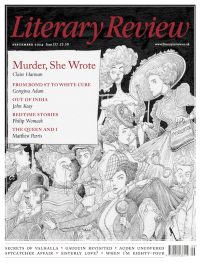Richard Vinen
Tories on the Home Front
Blue Jerusalem: British Conservatism, Winston Churchill, and the Second World War
By Kit Kowol
Oxford University Press 352pp £30
Publishers believe that Churchill sells books. This presumably accounts for the subtitle of Kit Kowol’s excellent monograph on Conservative politics during the Second World War, which, in fact, says little about the man who was prime minister from May 1940 until July 1945. Readers, however, will have no reason to think that they have been short-changed. In many ways, the absence of Churchill is one of the book’s strengths. It feels as if one is being shown around a familiar building from which the furniture has been removed: one sees features of the architecture that were previously obscured.
Kowol’s central argument about wartime conservatism is simply that such a thing existed. Most historians of Britain in the Second World War can be divided into two groups. One examines the conduct of the war, which means a heavy emphasis on Churchill and his entourage rather than domestic politics. The other focuses on the home front. This groups gives more weight to civilians than soldiers and presents Labour ministers as controlling domestic policy and laying the foundations of the welfare state, behind the backs of the Tories.
But Kowol points out that the Conservatives had won the great majority of seats in the 1935 general election, the last to be held before the war, and were, therefore, dominant in the wartime government. He does not see the creation of the coalition in May 1940 as the end

Sign Up to our newsletter
Receive free articles, highlights from the archive, news, details of prizes, and much more.@Lit_Review
Follow Literary Review on Twitter
Twitter Feed
Under its longest-serving editor, Graydon Carter, Vanity Fair was that rare thing – a New York society magazine that published serious journalism.
@PeterPeteryork looks at what Carter got right.
Peter York - Deluxe Editions
Peter York: Deluxe Editions - When the Going Was Good: An Editor’s Adventures During the Last Golden Age of Magazines by Graydon Carter
literaryreview.co.uk
Henry James returned to America in 1904 with three objectives: to see his brother William, to deliver a series of lectures on Balzac, and to gather material for a pair of books about modern America.
Peter Rose follows James out west.
Peter Rose - The Restless Analyst
Peter Rose: The Restless Analyst - Henry James Comes Home: Rediscovering America in the Gilded Age by Peter Brooks...
literaryreview.co.uk
Vladimir Putin served his apprenticeship in the KGB toward the end of the Cold War, a period during which Western societies were infiltrated by so-called 'illegals'.
Piers Brendon examines how the culture of Soviet spycraft shaped his thinking.
Piers Brendon - Tinker, Tailor, Sleeper, Troll
Piers Brendon: Tinker, Tailor, Sleeper, Troll - The Illegals: Russia’s Most Audacious Spies and the Plot to Infiltrate the West by Shaun Walker
literaryreview.co.uk